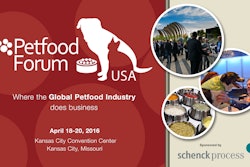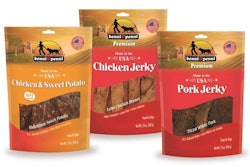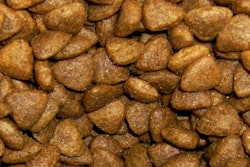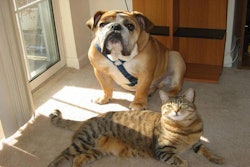
Humanization of pet food has come to this: 55% of US and French pet owners recently surveyed said if they were on a strict budget, they would give up chocolate to ensure they could buy a high-quality pet food with features important to them. (Wow. I love my cats and feed them very well, but giving up chocolate? I think I would have to find something else to sacrifice.)
This data point was one of the more curious among many that surfaced in the survey, conducted by Nielsen in fall 2015 of 3,562 US and French consumers, ages 18-65, who own at least one dog or one cat. Using a proprietary technology it calls Optimizer (“powered by an evolutionary algorithm”), Nielsen said it “evaluated more than 5 million product concept alternatives for dog and cat foods—including different combinations of benefits, claims, consumer insights and flavors—by asking consumers to make choices about which concepts they preferred.” Those choices were then revised to new concepts, a process that the research firm repeated to arrive at a set of top pet owner preferences.
These preferences may hold keys for pet food product developers looking for the next new innovative concepts and marketers deciding which label claims to prioritize. Consider:
Non-GMO claims top the list. This is not necessarily a surprise in terms of the French pet owners in the survey, since European countries and consumers have had a heightened awareness of GMOs (genetically modified organisms) for several years now; and indeed, 50% of the French respondents ranked non-GMO among their top three of 10 most important health-related pet food claims. What’s interesting is that 33% of the US pet owners had the same ranking. Further, when all respondents evaluated thousands of actual product concepts for dog and cat foods, non-GMO ingredients was the top-performing claim, “appearing in 74% of all concepts preferred by consumers across food types and countries,” the report said.
Among these consumers that prefer non-GMO claims, at least half said they believe GMOs are unnatural, with an unknown long-term impact on health and “they themselves don’t want to eat GMOs so their pets shouldn’t have to.” In fact, 48% of the pet owners surveyed said they would be willing to pay more for non-GMO products than for any other claim listed.
Natural claims beat out science-related ones. Pet owners are increasingly believing that pet foods with natural claims have unique health advantages (think “natural digestive enzymes,” a claim that resonated with 65% of study respondents), while claims such as “scientifically formulated” are falling out of favor, with only 55% preferring it. Nielsen said that “scientific” is becoming a polarizing term, at least partially due to confusion over its meaning. (Which I find ironic, given that so many consumers are confused over the use of “natural” on human and pet foods that they’re even filing class-action lawsuits, and the US Food and Drug Administration (FDA) is considering more formal regulation of the claim on human foods.)
The Nielsen report included some actual quotes from pet owners, such as, “When I see the word ‘scientific,’ it makes me think the food has added preservatives and hormones,” and “What does ‘scientifically formulated’ mean? It sounds unnatural.” To that end, Nielsen recommended that pet food manufacturers wanting to leverage science-based strengths in their products should explain exactly what those are and what terms like “scientifically formulated” mean. Sound advice, and the same could apply to “natural” claims, too.
Making healthy, but not indulgent, pet food choices is key. In the study, among what Nielsen calls consumer insights, the top-performing ones by far were these two: “I care for my pet and choose foods that provide all the required nutrients for a healthy life” and “I’m responsible for the health and well-being of my pet, so my food choices are important.” Further, 85% of respondents believe they can extend the lives of their pets based on the foods they feed them.
Another curious finding is that 90% said it’s important for their pets to look healthy on the outside—despite other studies showing the prevalence of overweight and obesity at least in US pets, and the lack of awareness among owners that their pets are not a healthy weight. But perhaps awareness is growing: Nielsen said another recent study found that Millennials, at 37%, were more inclined than older generations to worry that the pet food they buy is making their pets obese.
Pet owners are open to new formats and types of pet food products. As long as they’re also focused on health, that is. For example, nearly half of respondents (47% of US and 46% of French pet owners) expressed interest in fruit or vegetable chews for pets, especially for dogs, and 34% of US owners and 24% of French owners favored vitamin-enriched waters for pets. Overall, US pet owners seemed most open to new types of products, such as nutrient drops or powders added to regular pet food (36% interest), soups and stews (35%), flavor-enhancing drops to add to pet food (29%), energy-boosting snacks (27%) and protein bars (22%).



















